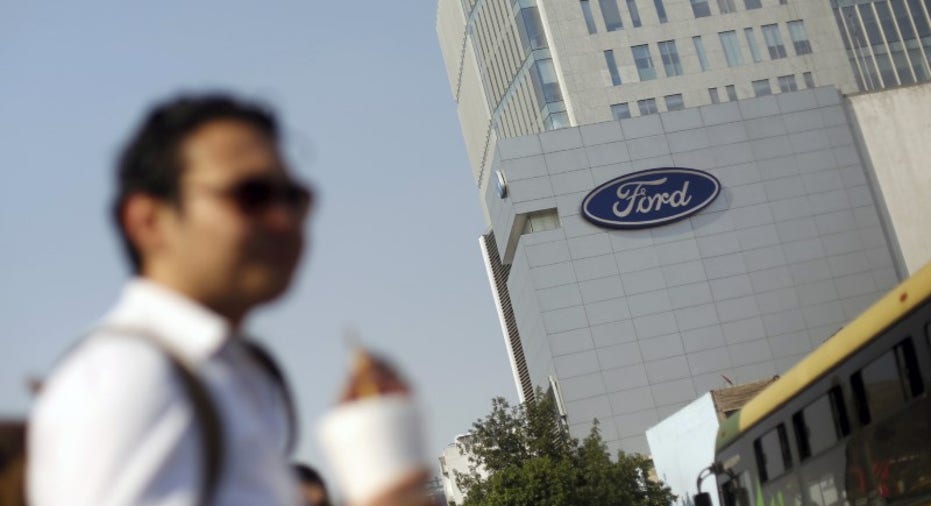Automakers, dependent on Mexico, face a rougher road with Trump

The election of Republican Donald Trump as U.S. president puts new pressure on automakers and other manufacturers that have come to depend on open trade with Mexico and now face the risk of higher costs.
At the same time, investors are betting that some big U.S. manufacturers, such as mining and heavy equipment maker Caterpillar Inc , could get a lift if the new administration brings changes in energy, climate and tax policies.
Caterpillar stock soared more than 7 percent on hopes that a Trump administration would reinvigorate coal mining and investment in infrastructure. The slump in mining has depressed Caterpillar's profits and forced rounds of layoffs.
"There is bountiful evidence that free trade, tax reform, infrastructure investment and smart regulation are critically important to manufacturers��� success," Caterpillar said. However, shares of U.S. automakers, which rely heavily on parts and vehicles made in Mexico to feed their U.S. manufacturing and sales operations, fell on Wednesday.
General Motors Co shares dropped 4.3 percent. The automaker said on Wednesday that it was laying off 2,000 people and cutting a shift at a Lordstown, Ohio, factory that builds Chevrolet Cruze small cars and at a Lansing, Michigan, plant that builds slow-selling Cadillac sedans and Chevrolet Camaro sports cars.
Ford Motor Co shares were down 1.1 percent, and electric luxury car maker Tesla Motors Inc shed 4.8 percent.
Shares of big automotive parts makers that have shifted operations to Mexico were hit hard. Delphi Automotive Plc fell nearly 9 percent. Canada's Magna International Inc , whose Mexican operations account for about 14 percent of sales, was down 5 percent.
Trump made attacks on the outsourcing of American auto jobs to Mexico a recurrent theme in his campaign, a message that rallied blue-collar workers while threatening to upend the business assumptions behind billions of dollars in planned investment by the auto industry.
TENSION OVER FORD PLANTS
In announcing his campaign in June 2015, Trump vowed to block Ford from opening a new plant in Mexico and threatened to impose tariffs on cars it shipped back across the border.
But those moves would force U.S. consumers to pay higher prices for vehicles, said Charles Chesbrough, senior economist at the Detroit-based Original Equipment Suppliers Association trade group.
"(Trump's) trade policies could add $5,000 or more to the price of a small car from Mexico," Chesbrough said.
U.S. vehicle manufacturers and many of their suppliers have based billions of dollars of investment on relatively open trade with Mexico, China and other countries.
Ford in April announced plans to invest $1.6 billion to expand production of small cars in Mexico. Trump took aim at that move as well as GM's plans to invest $5 billion there.
GM said in a statement on Wednesday that it "looks forward to working with President-elect Trump and the new Congress on policies that support a strong and competitive U.S. manufacturing base."
Ford spokeswoman Christin Baker said: "We agree with Mr. Trump that it is really important to unite the country ��� and we look forward to working together to support economic growth and jobs."
In September, Ford said it would shift small-car production from U.S. plants to lower-cost Mexico, drawing another rebuke from Trump.
"We shouldn't allow it to happen," Trump said.
The company said its decision to build new vehicles in Mexico would not cost U.S. jobs.
Ford Executive Chairman Bill Ford last month said he met with Trump to discuss criticism from the candidate but called the discussion "infuriating" and "frustrating." Ford said his company employed more people at its U.S. plants than any other automaker.
Between 1994 and 2013, the number of auto factory jobs dropped by a third in the United States and rose almost fivefold in Mexico as lower-wage production boomed.
Mexico now accounts for 20 percent of all vehicle production in North America and has attracted more than $24 billion in investment from the industry since 2010, according to the Ann Arbor, Michigan-based Center for Automotive Research.
Based on current investment plans, Mexico���s auto production capacity will grow by another 50 percent over the next five years, said the center, which draws funding from the industry.
"Dismantling NAFTA at this point would be pretty hard to do," said Kristin Dziczek, the center's director of industry, labor and economics.
(Reporting by Paul Lienert in Detroit and Meredith Davis in Chicago; Additional reporting by David Shepardson in Washington and Naomi Tajitsu in Tokyo; Writing by Joe White; Editing by Kevin Krolicki and Lisa Von Ahn)



















